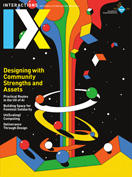Authors: William Gaver
Posted: Wed, May 22, 2013 - 2:52:21
When she was about five, I told my daughter Emmie about a girl named Priscilla who swallowed toothpaste instead of spitting it out after brushing. She did this every day, week after week and month after month, because she liked the taste of toothpaste. After some time, however, Priscilla found that her joints were getting stiff. A little while later, she stopped being able to move, and her skin turned pale and unhealthy-looking. Finally, she became completely rigid. People were horrified to find that, when they peeled off the thin layer of moldering skin that remained, all that was left of Priscilla was a life-sized statue made of hardened toothpaste.
It was a dreadful story. And the beauty of it was, Emmie believed me! She did—she honestly didn’t know whether I was telling her the truth, or making it up! It was great.
Obviously, I told this far-fetched story—or rather, it told itself as I was helping Emmie brush her teeth—to make a worthy rhetorical point. I tell my kids lots of lies like these, often to moderate their tendency to see every passing setback or emotional upset as a world-shaking event. If they carry on over some minor hurt, for instance, I will routinely start making preparations to take them to the hospital, ignoring them when they protest. If they whine about how far we have to go, I carefully explain that we’ll be breaking for dinner soon, then finding a place to sleep, and that we should arrive just after lunch the next day—piling on details even as the bus is pulling up to our stop. And there used to be no better way to cheer up a grumpy toddler than to tell her that it was “No Smiling Day” and that absolutely, under no circumstances, should she dare to let anybody see her looking happy.
But I also tell lies to my kids because I can. Kids are pretty easy to fool with the most outlandish things. Think of it from their point of view: The world is a strange place, and if you don’t have much experience of it, who knows what might be true? I like to take advantage of this naiveté. For instance, during one holiday I used the remote-control key fob to convince my kid that she could lock and unlock our hire car’s doors by waving her hand. This became such a routine that when I reminded her to lock up one night as she trudged exhaustedly toward our room, she finally gave a begrudging, over-the-shoulder wave that conveyed eloquently her view of this small but unwelcome chore. I’m not sure, now, whether she really believed she had to lock the car, or was just reluctantly humoring us, and I’m not sure if it matters. Either way, it’s a memory to treasure.
It’s fun to see whether you can carry off the Big Lie: for instance, that the even numbers were only invented in the 1970s; or that the kids used to have an older sister named Anesthesia, but she was carried aloft by her umbrella one day at the beach and is now reported to be living in Sweden; or that their mother and father are aliens from a distant star system who adopted them to help pass as humans. Stories like these are surprisingly easy to put across—you just need to sound matter-of-fact, and add lots of incidental detail.
Sometimes people look aghast when they hear about the things I tell my children. Every once in a while, I even feel a twinge of guilt when I see myself through other parents’ eyes. But on the whole, I think lying is not only fun for me, but probably good for the kids as well. For a while, they get to experience a different variation on reality. It allows them to entertain new ideas and possibilities, to work out the implications of unusual premises, and to distinguish the impossible from the merely improbable. And I always relent in the end, when they demand to know whether some outlandish story is true. Contrast this with the “traditional stories” we tell about Santa Claus or the Tooth Fairy: Far from rewarding their debunking, after kids begin to have doubts we coerce them into complicity (“Children who don’t believe in Santa Claus don’t get any toys”) and even encourage them to join the conspiracy (“Don’t spoil it for your younger sister”). Teaching kids to deny their perceptions in the face of power may be a valuable life-long lesson, but I’d prefer to exercise their skepticism toward authority.
Given how many people try to sell us stories on a day-to-day basis—politicians, advertisers, even HCI researchers— it seems like a good idea to encourage a questioning attitude. So I’m pleased when, nowadays, my kids complain proudly that “papa is a liar,” and even more so when they play me back. For instance, when they hurt themselves, I used to distract them by asking them how many fingers I was holding up, and either pretending to be concerned that they were wrong, or switching my fingers around just as they answered. It used to baffle them no end— but then they learned to counter that ploy by saying the wrong amount from the beginning. How proud I was!
So why am I writing this here? Apart from any pressing need to confess, reflecting on how I lie to my kids raises two issues. First, telling the truth might not always be an absolute good. It’s not that I think our interfaces should lie to us, necessarily, but perhaps they could spin a good story on occasion. Most systems nowadays seem bent on making life more comfortable and convenient. They show us the books “people like us” have bought, target advertisements to our demographics, and tune search results to reflect who and where we are. We can already select the political orientation of the news we encounter, and surely this will be done automatically before long. The end game seems to be to make our lives so predictable, so unthreatening, that we can doze our days away, stirring only occasionally to make the latest purchase or cast the next predictable vote.
Perhaps the lies I tell my kids could serve as a small inspiration to design systems that make everyday life just a bit more challenging. For instance, it might add to a sense of enchantment about the world if our online maps showed an imaginary wonderland just out of sight, or if chatty emails from fictional characters occasionally appeared in our inboxes. More intriguing, perhaps, would be systems that juxtapose facts to support unusual interpretations, rather than safe ones. Instead of seeing the most popular combinations of purchases, for example, we might see those that occur less frequently—not so rare as to be essentially random, but odd enough to suggest strange ways of seeing the world (“If you like interactions you should also consider this marlin spike”). Rather than focusing on the most likely truth, we could play with more unusual realities.
The idea that our systems don’t have to be so straightforwardly helpful is related to another thing I’ve learnt from lying to my kids: They can take it. So much research on children, or older people, or minority populations— actually, so much research in general—adopts an attitude of earnest sincerity, like a wide-eyed nursery school teacher tending a scraped knee. This is all meant well, I’m sure, but it tends to treat people as half-wits or weaklings. In my experience, all the people I’ve designed for, from nuns to elderly immigrants, have dealt readily with strange ideas, playfulness, and seemingly “inappropriate” material. People, including kids, may not always need or welcome our solicitousness and care. Maybe we shouldn’t tell them out-and-out lies, but we can certainly entertain them with unfamiliar stories. Not only can they handle them, but they can counter them with surprising stories of their own. Just like my kids.
(In my next blog, I’ll explain the AI algorithm that automatically generated this story as well as my last three conference papers.)
Bill Gaver is professor of design at Interaction Research Studio, Goldsmiths, University of London.
Posted in: on Wed, May 22, 2013 - 2:52:21






Post Comment
@Jonathan Grudin (2013 06 02)
Interesting, Bill. Since I adopted almost exactly the opposite approach (they are now 11 and 13) perhaps we can do a small-n comparison down the road and undoubtedly discover it matters not at all what parents say. The question I have is why is lying and getting away with it fun for you? And with that off to see the third week of the second year of In Treatment.